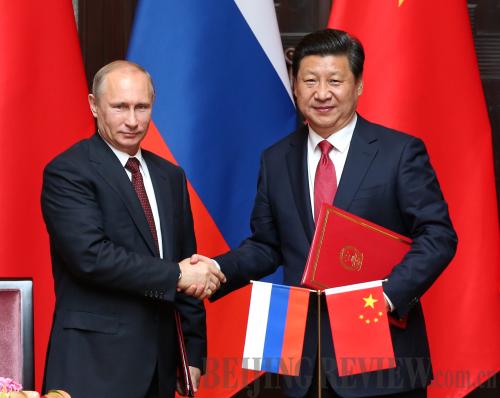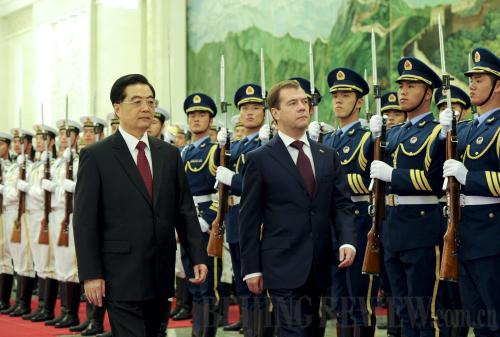|
 |
|
EXPANDING COOPERATION: Chinese President Xi Jinping and Russian President Vladimir Putin sign a joint statement aimed at expanding cooperation in all fields and coordinating diplomatic efforts following their talks in Shanghai on May 20 (PANG XINGLEI) |

In the last 65 years since the establishment of their diplomatic relationship, China-Russia (former Soviet Union) relations have undergone several stages—from alliance to confrontation, followed by normalization and a strategic partnership. At present, China-Russia relationship is among the most mature of those between major powers. The two countries actively support one another, meanwhile they are partners—not allies.
A steady pace
The basic trend of the China-Russia relationship is one of constant progression, which is clearly different from the "neither better nor worse" Sino-U.S. relations. What's more, there have been a series of documents and mechanisms that ensure the general direction of bilateral ties.
Since China and Russia signed a joint statement on the foundation for bilateral ties in 1992, their relationship began a new chapter. In 1996, the two countries established a partnership of strategic coordination. In 2001, China and Russia signed the Treaty of Good-Neighborliness and Friendly Cooperation, laying a strong legal foundation for the two countries to develop their strategic partnership. In February 2013, China and Russia signed a joint statement to deepen their comprehensive strategic partnership of coordination, bringing bilateral relationship to an unprecedented level.
During this period, China and Russia have also solved complex boundary demarcation issues, putting prior border disputes behind them.
Another important factor that guarantees the stable development of the China-Russia relationship is the establishment of a set of effective cooperative mechanisms.
The two countries have successively established a mechanism for annual exchange of high-level visits and numerous non-governmental exchange platforms to enhance mutual understanding and settle differences in time.
State heads of the two countries also hold regular meetings on international occasions, such as annual summits of the Shanghai Cooperation Organization (SCO), the BRICS group of emerging economies and the Asia-Pacific Economic Cooperation forum. Since Chinese President Xi Jinping took office in March 2013, he has met Russian President Vladimir Putin on nine occasions.
 |
|
STATE GUEST: Chinese President Hu Jintao and his visiting Russian counterpart Dmitry Medvedev review honor guards at a welcoming ceremony in Beijing on September 27, 2012 (LI XUEREN) |
As of 2013, there had been 18 annual meetings between Chinese and Russian prime ministers since their regular meeting mechanism was launched in 1996. The mechanism has become another important platform to outline and coordinate bilateral cooperation in various fields.
After China and Russia conducted their first joint military drill in 2005, the frequency and scale of such exercises have both increased. Over the past two years, they held two joint exercises each year, including a joint anti-terror exercise under the SCO framework. Last year, the Russian Defense Ministry invited President Xi to visit its command center, revealing a strong mutual trust between the two countries.
The scale of people-to-people exchanges between China and Russia in recent years has been unparalleled. Since 2006, the two countries have successfully held a series of events such as the National Year, Year of Languages and Year of Tourism. In 2014 and 2015, the two sides will also hold their Year of Youth Friendly Exchanges. Benefiting from close interactions, there are a growing number of people on both sides who regard each other as friends, which has consolidated public support for good-neighborly friendship between the two countries.
| 